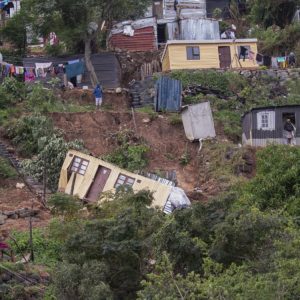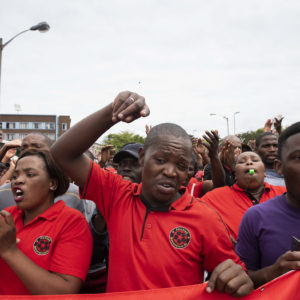Floods and disaster capitalism prey on KwaZulu-Natal
The recent devastation in Durban and surrounds shows the fatal intersection between climate change and kleptocracy in a political environment hostile to all alternatives.
Author:
11 May 2022

What meteorologists call a “weather bomb” hit KwaZulu-Natal in April. A relentless barrage of more than 300mm of rain unleashed in 24 hours tore into infrastructure, levelled homes and killed at least 450 people.
The aftermath has seen many people without power and fresh water. Shack settlements, where a quarter of the residents of Durban live, have been especially ravaged. Both President Cyril Ramaphosa and Minister Nkosazana Dlamini-Zuma were quick to point out how such extreme weather and disasters are a consequence of climate change and rising global temperatures.
Showing the condescension typical of our political ruling class, Dlamini-Zuma shifted blame on to the impoverished, pointing to people building on flood plains as an explanation for the rate of property destruction. What she omitted was why people are forced to erect settlements in such precarious spaces in the first place, itself rooted in the government’s failure to undertake a serious project of urban land reform and provide adequate public housing.
Related article:
She and the president framed climate change as an unstoppable process, which distorts how it is not some natural punishment from above but the direct result of fossil fuel industries continuing to pump greenhouse gases into the atmosphere and governments across the globe failing to take the political and economic steps needed to ensure a stable climate.
The ANC has failed to address the legacy of extractive mining since 1994, which has made South Africa especially vulnerable to environmental shocks. The government’s rent-seeking attitude and proximity to mining capital means that South Africa hosts the most polluted cities on the continent. Coal plants poison everything around them, but Eskom cannot even ensure a stable electricity supply. The state goes out of its way to frustrate every effort to work with trade unions to ensure a just transition to socially owned renewable energy, and continues to award reckless oil and gas contracts, as long as money is kicked up.
But extreme weather also crashed into political dysfunction, as years of maladministration and municipal corruption has meant that key areas of risk mitigation, such as storm drains, have been criminally neglected.
The rule of the gun increasingly defines politics in KwaZulu-Natal, where assassinations, often conducted by taxi-syndicate hitmen, are a regular occurrence, violent “business forums” that extort money are on the rise and Abahalali baseMjondolo is continually repressed.
Related article:
The criminalisation of politics in KwaZulu-Natal is rooted in the kleptocracy and cynicism associated with Jacob Zuma, whose supporters helped initiate the rioting and chaos of July 2021, from which the province was still recovering before the nightmare storm. In an act of openly sociopathic contempt for society, mere days before the disaster the ANC eThekwini branch elected Zandile Gumede as their chairperson, despite the fact that she is currently facing criminal changes relating to contracts awarded while she was mayor.
But even if the city was better governed, the disaster would have caused extensive damage in urban and peri-urban areas. The current urban model of concrete and highways is not only a cause of carbon emissions, it is also ill-prepared to handle extreme weathers. Urban sprawl, unregulated development and a general lack of planning has meant the destruction of many natural barriers and wetlands that would otherwise help to diffuse the wrath of the increasingly ferocious Indian Ocean and the weather patterns it influences.
This led to JG Ballard-style images of collapse, such as shipping containers floating down a flooded highway. These drowned metal giants speak of a society unprepared for a future of weather bombs and constant supply-chain disruptions.
Predator capitalism
Rather than being a separate problem, climate instability and environmental breakdown act to intensify existing political and economic dysfunction. This crisis has its roots in centuries of domination and exploitation, and ideologies that hold that the natural world exists only to be hacked, burned and crushed for profit.
Since the late 1970s, rising temperatures have been accompanied by the dominance of neoliberalism, which aims to subordinate every aspect of politics and social life to the devourer logic of the market. This not only undermines efforts to address the very real prospect that much of this planet will be unlivable within the coming century, it also means that many corporations and governments view this permanent state of disaster as an opportunity for extending profit and power.
In her 2007 book The Shock Doctrine, Canadian writer Naomi Klein described an era of “disaster capitalism”, in which wars, natural disasters and other social calamities become an opportunity for elites to intensify privatisation and create new markets. For instance, private prison and security companies have come to characterise emergency relief and migration. A tiny minority stands to make fortunes off environmental disasters displacing millions of people.
This attitude filters down to municipal politics where, as in Durban, too many civil servants see themselves as piratical entrepreneurs who work only to enrich themselves through public funds. It is reflected in the normalisation of civil servants wearing high-end designer gear and driving luxury vehicles, while treating residents with casual contempt.
Related article:
Economist Peter Fleming argues that in an age of escalating economic and environmental crisis, capitalism is defined not by growth or productivity but by “wreckage economics”. Financial and political elites capture state institutions and the public commons, wring them of all value then leave everyone to survive in a harsher, more dilapidated society.
This also means that politicians and the police are even more hostile to any effort to build alternatives to this system. In Durban, the eKhenana occupation has worked to build food gardens and create an autonomous and democratically managed space for the impoverished since 2018. This is a living example of responding to environmental precarity by building local food security.
But local elites have responded with persistent violence, including the assassination of Ayanda Ngila on 8 March and Nokuthula Mabaso on 5 May. We have a system that is not only environmentally and economically dysfunctional, but also fatally hostile to any efforts to create democratic and non-violent alternatives to it.
Building futures
As the destruction of KwaZulu-Natal shows, the environmental crisis must be connected to the bread-and-butter issues of housing, food sovereignty and freedom from repression.
There can be no social justice on a dying planet. But equally, the way in which the climate crisis is discussed in South Africa often represents elite perspectives rather than carefully thinking of how to create a truly just transition, where renewable energy and rebuilding infrastructure is used to actively address social inequality and poverty. Currently, the discussions on issues like renewable energy are dominated by a simplistic discourse, marked by fantasies of privatisation as the answer to a kleptocratic state. There is no discussion of what kind of society we actually want to live in.
The alternative to Eskom as it currently exists does not have to be renewable energy companies owned by well-connected people and employing very few workers. There can be, as the trade union movement has insisted, socially owned and worker-controlled alternatives. At a national level, a progressive energy transition could entail the creation of decent work through building and sustaining renewable infrastructure, while also ensuring that workers in fossil fuels are reskilled and adequately compensated. It would mean pushing for well located and constructed social housing, and access to land, food gardens and mass transit.
Related article:
But it also means asserting popular power at the local level, such as forcing accountability for delinquent municipal governments, experiments with decentralised technology and farming, and reimaging living spaces to be more ecologically balanced. These are struggles that will take decades, but in the very process of fighting for them, we will lead lives less alienated and more human.
The KwaZulu-Natal floods show that we need to think on a far more adventurous scale than just battening down against the next storm. The flooded road in front of us offers a choice between more collapse and a renaissance that can be achieved by learning to live with, rather than against, the natural world.




